< Back to Historical Archives main page
Summary of the First Thirty-Five Years: 1885 - 1919
Birthed from literary societies
The development of competition in oratory and debate on The Hill almost certainly followed the same trajectory as that of many--if not most--other colleges. The story a reader finds here is, then, not only ordinary, but potentially instructive for understanding the early histories of competitive forensics across the nation, outside of older Ivy League schools. Speech education and intercollegiate debate competition achieved national acceptance in the late Nineteenth Century, precisely when Western's precursor institutions were founded.1 A student activity vacuum had been created at colleges when an upswell of public critique of the emphasis on collegiate sports brought colleges to appreciate the value to citizenship of debate and oratory. Up to this point, students had commonly given speeches to the student body at school chapel services, and both oratory and debate were relatively common as teaching aids in a liberal education. And students tended to do this as part of their responsibilities as a member of a type of student cohort known as a literary society. It was in this environment that competition began.
Nineteenth Century and early Twentieth Century colleges often either required all students join one of the school's literary societies or simply offered a few hours of course credit for it, and schools generally hosted several such societies. But as a device of social structure the societies of colleges across the nation were becoming inadequate in the face of growing demands. In 1897 an Ohio professor of Oratory contended that student interest in debate was no longer fulfilled by the society social structure, so the students pushed to create new venues for competition.(Ibid) Both the Universities of West Virginia and Kentucky experienced the same in this period, suggesting that the literary society decline was indeed a nation-wide issue, and the culprit seemed to be a growing student body.2 The equal opportunity ethos of the Victorian college, sustained by the social structure of the societies, could not withstand growing collegiate populations. And as societies declined, so clubs, greek organizations, and sports teams grew in their stead.
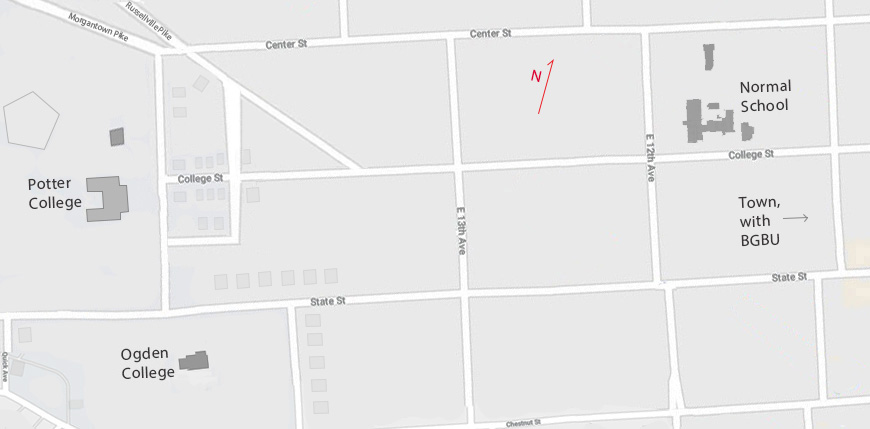 The earliest known competitions in speech and debate on The Hill began at Ogden College
for Young Men, a precursor school located on the site of what is--as of this writing--WKU's
science buildings. The Ogden Oratorical and the Robinson Declamation competitions
began in 1885 and were confined to students of that college.3 The Ogden Oratorical, honoring the founder of the college, was for the upper two
classes and was hosted on what was often known as Ogden Day, in mid-April. The Declamation,
honoring John E. Robinson, was for the lower two classes, which included many boys
of high school equivalence. The popularity of these contests is difficult to judge,
though multiple College Heights Herald articles in 1950 and 1951 claim that competition
in the Robinson Declamation contest had once been compulsory for all Ogden College
students. Regarding debate, the college had formed an Ogden Literary Society in 1880,
which is recorded below as having debated Bethel College in 1914.4 Ogden College was not, however, the only precursor school competing.
The earliest known competitions in speech and debate on The Hill began at Ogden College
for Young Men, a precursor school located on the site of what is--as of this writing--WKU's
science buildings. The Ogden Oratorical and the Robinson Declamation competitions
began in 1885 and were confined to students of that college.3 The Ogden Oratorical, honoring the founder of the college, was for the upper two
classes and was hosted on what was often known as Ogden Day, in mid-April. The Declamation,
honoring John E. Robinson, was for the lower two classes, which included many boys
of high school equivalence. The popularity of these contests is difficult to judge,
though multiple College Heights Herald articles in 1950 and 1951 claim that competition
in the Robinson Declamation contest had once been compulsory for all Ogden College
students. Regarding debate, the college had formed an Ogden Literary Society in 1880,
which is recorded below as having debated Bethel College in 1914.4 Ogden College was not, however, the only precursor school competing.
The Southern Normal School--later known as Western Kentucky State Normal School, in downtown Bowling Green--hosted intramural oratorical contests in 1899 and 1900, but annual competitions began in 1910, pitting representatives from each of the four classes of the college. The winner of that 1910 contest went on to represent the school at the earliest intercollegiate contest in our records. For reference, 1910 also marks the merging of Pleasant J. Potter College for Young Ladies into the Normal School.
The shape of forensics
The nature of intercollegiate debate in this period was as follows: three or four representatives each from two schools met for a single match or both fielded affirmative and negative teams for dual matches--each sending a team to the other's school. Repeating debates against multiple schools for a cumulative score had to wait until the 1950s for Western.
Debate, oratory, and what a reader of 2016 would recognize as interpretive reading all began on The Hill at around the same time. The 1899 competition in elocution featured reading aloud from literature for emotional and contemplative impact. By 1916, the then-decades-old Robinson Declamation contest certainly featured the same, but whether that was the original content of the 1885 contest remains unknown.
Collegiate forensics in Kentucky
Although these archives do not thoroughly explore the forensic universe available to The Hill, some must be examined in order to understand context. The Kentucky Intercollegiate Oratory Association--which acted as a qualifier for the Interstate Oratorical Association tournament--formed in 1888, and the Kentucky Intercollegiate Debating Association formed some time before 1905.5 Why the early institutions of WKU did not compete in those tournaments for the first few decades is unknown. Other organizations, such as the Central Oratorical League, the Civic Intercollegiate Oratorical League, the Southern Oratorical Association, and the Southern Interstate Oratorical Association offered opportunities which might take a competitor much further abroad. Although the Normal School did join in a league in 1910 the school ended up not competing there, and records of competition in oratory abroad only appear again in 1927.
Why neither Ogden College nor the Normal School competed in any of the available intercollegiate leagues for this period is uncertain, but possible explanations can be explored. The intercollegiate leagues were not generally open to any interested school, but instead required invitation. That invitation was reserved for schools of prominence during most of this period. While the Normal School did join what appears to have been an Ohio-based league in 1910, that league was newly re-formed due to precisely the logistical problems of building an organization of few schools across a large area.13 That 1910 contest, also, never occurred. Additionally, the President of the Normal School, Henry Cherry, is known to have opposed extracurricular activities. Forensics was one of many intercollegiate activities that the Normal School was slow to adopt. While Ogden College did engage in some intercollegiate debate, the scope was more local.
Sources and procedure
Oratory and recitation were routine educational activities, and at times a literary society or a class cohort--such as the Normal School's sophomores--took it a step further and created a contest. Intra-society contests were also common means whereby a class cohort chose a representative for the inter-society contest. This first qualifier level of contest is not recorded in these archives, due to its more casual nature, and for the sake of simplicity.
This period records competition from multiple precursor institutions: Southern Normal School and Business College, Western Kentucky State Normal School, Ogden College for Men, and--partially--Bowling Green Business University. The first transformed into the second, and the third merged into the former by 1928. The latter is briefly mentioned, but left largely outside these archives because it remained mostly independent of the rest of Western long after the others fused. Note that Pleasant J. Potter College for Ladies does not appear to have competed in such activities.
Note that our access to the 1916-17 through 1922-23 period is obscured due to a dearth of sources covering student activities. The Normal School's student publication ceased in 1916, and the Talisman--yearbook--began in 1923, with a permanent newspaper in January 1925. Ogden College began a student newspaper in January 1922. This apparent six-year gap is presumed to reflect only a problem of sources.
Participation of women
The women of the Western Kentucky State Normal School may have competed in debate with each other on a few occasions, but only one such debate has yet been discovered for this period, and no records have yet been found of gender-integrated debates. That would change in the following decade. Competition in oratory offers a fuller story. Women competed in the first known elocution--think interpretation--contest in 1899. In the same year that the Normal School purchased the Pleasant J. Potter College for Young Ladies--1910--two women of the Normal School distinguished themselves in the new Normal School intramural oratorical contest, and one of the two then competed in the school's first intercollegiate oratorical contest. The next year, however, saw the elimination of the only woman in the intramural competition, though for reasons unknown. Only a year later, when the 1912 Kit Kat oratorical contest determined its representative for the inter-society contest, they offered only a consolation prize for women competitors, reserving the right of class representation in the latter school-wide contest only to the men.6 Whether this continued or changed within the decade is, as yet, unknown. At various points in these early decades women were involved in competition for a year or a few, and then no more. This author suspects that as competitions became regular, in an effort to raise a competitive activity's status from a sort of communal participation event to an elite contest, exclusion was a means to that end. However, these archives explore, but do not attempt a sufficient explanation for, these matters. There may be room for additional study of this subject.
Annual Subsections: 1885 - 1919
1885 to 1909
Ogden and Robinson oratorical winners
From this point until 1928 these archives will mostly follow two separate schools in Bowling Green: the Southern Normal School (later, Western Kentucky Normal School) in the downtown area and Ogden College on the lower part of The Hill. Potter College, right next to Ogden, does not appear to have competed in these activities.
For the first decade and a half, we know of only Ogden College's intramural oratorical contests.
|
The winners of the intramural Ogden Oratorical and Robinson Declamation competitions between 1885 and 1909 are recorded as a simple list to the right. After this, the winners will be listed within annual subsections beneath the subheading "Ogden College oratory" until 1928, thereafter "Campus oratory." For this period, and on until 1928 when the school merged into the Normal School & Teacher's College, these contests were only for students of Ogden College for Men. Gauging the import of the contest remains elusive, though the Western Kentucky Teachers College catalog of 1941 treated them as primary marks of distinction; under the school's "Awards" section, the only item highlighted was the Robinson Declamation competition. Presently, declamation restricts the speaker to orations or public speeches. Interestingly, the Robinson Declamation speakers in 1916 performed what forensic competitors of 2016 would recognize not as declamation, but as prose and dramatic interpretation: excerpts from Dickens' Oliver Twist and Scott's Ivanhoe. |
Ogden Medal Winners
|
Robinson Award Winners
|
1898-99 - Southern Normal School Elocution and Oratory
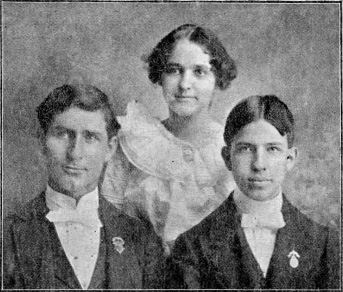 As part of the two-week commencement exercises of the summer of 1899, the School
of Elocution and Oratory at the Southern Normal School hosted two "Gold Medal" contests
for both Elocution and for Oratory.7 They were coached by the E&O professor, Francis Joseph Brown. To the right are the
two winners, as well as the winner of the Ogden College Robinson Oratorical medal,
Silas bent. Three women contested for the Frank Maier Gold Medal for Excellence in
Elocution: Mattye Reid, Annabel Price, and Jennie Williams. Ms. Annabel Price won. Three men contested the Henry Hardin Cherry Gold Medal for Best Original Oration:
M.F. Parker, W.P. Dies, and W.B. Crichlow. Mr. M.F. Parker won.
As part of the two-week commencement exercises of the summer of 1899, the School
of Elocution and Oratory at the Southern Normal School hosted two "Gold Medal" contests
for both Elocution and for Oratory.7 They were coached by the E&O professor, Francis Joseph Brown. To the right are the
two winners, as well as the winner of the Ogden College Robinson Oratorical medal,
Silas bent. Three women contested for the Frank Maier Gold Medal for Excellence in
Elocution: Mattye Reid, Annabel Price, and Jennie Williams. Ms. Annabel Price won. Three men contested the Henry Hardin Cherry Gold Medal for Best Original Oration:
M.F. Parker, W.P. Dies, and W.B. Crichlow. Mr. M.F. Parker won.
1900 - Southern Normal School Elocution and Oratory
We know neither who competed in, nor who won, the medals in 1900, save that the contest was announced.8
1907-08 - BGBU's Big Four and Coreco debating societies
Records suggest that 1908 marks the first of a line of annual debates between the two debating societies of the Bowling Green Business University, named Big Four and Coreco. This school was located near downtown Bowling Green. Considering that the historical trajectory of the Business University was mostly parallel to that of the rest of Western for the next fifty years, we will not include much more of BGBU here. A copy of a later (1913) BGBU debate program can be found further below. Some students of the Western Kentucky State Normal School moved on to Bowling Green Business University to augment their studies. This could bring a student to be involved in competitive debate at both the Normal School and at BGBU. To add, in the late 1940s, after a long lull in Western debate, the debate societies of the two schools engaged in exhibition debates.
1909-10
Normal School Inter-society Oratorical contest and inter-collegiate contest
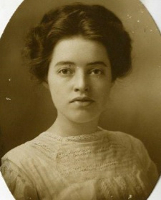
The Normal school joined the Central Oratorical League in either February or very early March, and created an intramural contest, the Inter-society Oratorical Contest, to determine the school's representative in that COL contest in Athens, Ohio.10 This pitted the school's five class cohorts against each other. The names of all five classes of the WKSNS in graduated order were as follows: Loyals, Pyerians, Kit Kats, Juniors, and Seniors.11 Note also that these inter-society oratorical contests were initially gender-integrated. The apparent and immediate decline of women competing in these events remains unexplained. Note: to the left is the runner-up in the inter-society contest, Mrs. Cole. As of this writing, no photo of the winner, Lucile Wade has been identified.
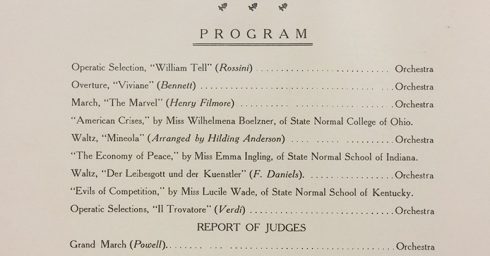 Click to the left for a full version of the 1910 program for the Normal school's first
known intercollegiate oratorical contest. The contestants for the first inter-society
oratorical, which determined the school's representative for the intercollegiate contest
are as follows: Ms. Lula Loraine Cole (life class; aka senior), Ms. Lucile Wade (four-year
society), Mr. Ford (Kit Kat), Mr. Gaines (pyerian), and Mr. Nichols (loyals).9 Lucile Wade won. In lieu of a photo of the winner, we have opted to feature the runner-up,
Ms. Loraine Cole. Note that the above source includes a verbose description of the
event. The winner of this contest, Ms. Lucile Wade, then represented the Normal School
in the earliest intercollegiate competition in these archives, a contest of perhaps a new organization named the Interstate Oratorical
Association hosted on the old Normal School campus downtown on 27 May 1910.10 This was not the IOA of national acclaim, but perhaps a new organization of at least
the three Normal schools who competed this year. Why the Normal did not send Ms. Wade
to the Central Oratorical League contest in Athens, OH is believed to be a cancellation
of that event.13
Click to the left for a full version of the 1910 program for the Normal school's first
known intercollegiate oratorical contest. The contestants for the first inter-society
oratorical, which determined the school's representative for the intercollegiate contest
are as follows: Ms. Lula Loraine Cole (life class; aka senior), Ms. Lucile Wade (four-year
society), Mr. Ford (Kit Kat), Mr. Gaines (pyerian), and Mr. Nichols (loyals).9 Lucile Wade won. In lieu of a photo of the winner, we have opted to feature the runner-up,
Ms. Loraine Cole. Note that the above source includes a verbose description of the
event. The winner of this contest, Ms. Lucile Wade, then represented the Normal School
in the earliest intercollegiate competition in these archives, a contest of perhaps a new organization named the Interstate Oratorical
Association hosted on the old Normal School campus downtown on 27 May 1910.10 This was not the IOA of national acclaim, but perhaps a new organization of at least
the three Normal schools who competed this year. Why the Normal did not send Ms. Wade
to the Central Oratorical League contest in Athens, OH is believed to be a cancellation
of that event.13
Ogden College oratory
Ogden:(not awarded); Robinson: Fred Harrison Jr. Note that the Ogden and Robinson winners prior to this date are listed above.
1910-11
Normal School oratory
Click on the program on the right for a full version. Contestants in the Second Annual Inter-Society Oratorical: John J. Hornback (senior), Miss Eva Belle Becker (junior), Mr. W.L. Matthews (Kit Kats), and Mr. Bert T. Rountree. The winner of this 1911 contest, W.L. Matthews, may have moved on to an interstate oratorical contest. Five months before this June contest the college's monthly student publication claimed exactly that.14 Whether this contest, or any of these inter-society contests, acted as a qualifier for a more prestigious contest has not yet clear. Originally, the Pyerian class provided its own orator--Miss Marion Simpson--but the program below indicates that the Loyals representative ended up representing both classes instead."14 Why this occurred is not known.
As a background, the Western Kentucky State Normal School purchased Pleasant J. Potter College for Young Ladies in 1910. On 4 February 1911, the Normal School would move up The Hill to the old Potter College site, thereafter known as Normal Heights.
Ogden College oratory
Ogden: Rogers Cooksey; Robinson:(not awarded)
1911-12
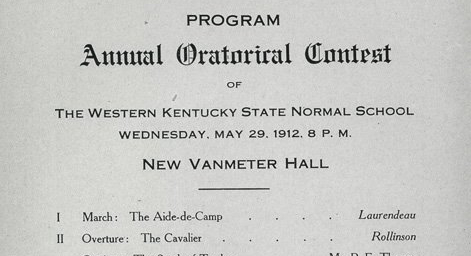 Normal School oratory
Normal School oratory
Click on the program on the right for a full version. Contestants in the Third Annual Inter-Society Oratorical: Mr. P. Elmo Thomas (Kit Kat), Mr. Salee C. Summers (senior), and Mr. Leslie P. Jones (junior).15 Jones was declared the winner.
Ogden College oratory
Ogden: George Gott; Robinson: Gaston Coke
1912-13
Normal School oratoryContestants in the Fourth Annual Inter-Society Oratorical: Mr. Jake D. Farris (sr), Mr. J.W. Vance (jr), Mr. Carlisle Morse (Kit Kat), Mr. Roach (loyals).16 J.W. Vance won. A copy of his speech can be found in the above source. Note that the two sources for this contest both declare it to have been the fifth annual, but only four contests have yet been discovered by this point. This author assumes a clerical error between this year and the previous that resulted in this. |
BGBU debate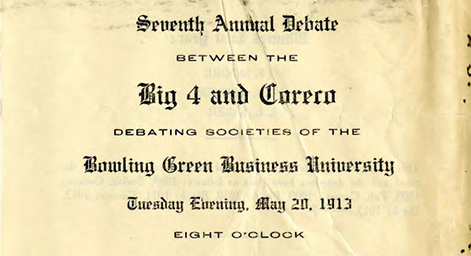 (click for full version)
Ogden College oratoryOgden: Charles S. Peete; Robinson: Brooks Scruggs |
1913-14
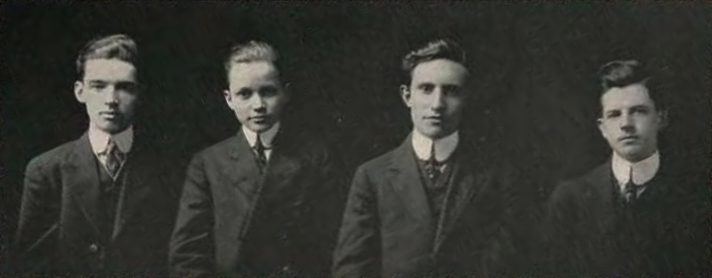
Ogden College debate
Ogden College hosted a debate against Russellville, KY's Bethel College on 3 April 1914.17 The resolution stated "Resolved, That the Monroe Doctrine should be abrogated." Its representatives are shown to the right: W.P. Smith, James Albert Mitchell, John Massey Donnelly, and Samuel Sumpter Daughtry (chair). The only two recorded as having debated, however, are Smith and Daughtry, who won.
Normal School oratory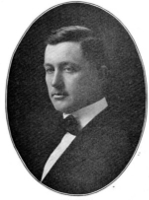 The Fifth Annual WKSNS Inter-society Oratory hosted on 6 June with the following
contestants: Mr. Andrew L. Cole (sr), Mr. Berthel Vincent (jr), Mr. Roy H. Matthews
(Kit Kat).18 Mr. Cole won, and a copy of his speech can be found in the above source. Click on
the image on the right to find the full event program. The Fifth Annual WKSNS Inter-society Oratory hosted on 6 June with the following
contestants: Mr. Andrew L. Cole (sr), Mr. Berthel Vincent (jr), Mr. Roy H. Matthews
(Kit Kat).18 Mr. Cole won, and a copy of his speech can be found in the above source. Click on
the image on the right to find the full event program.
|
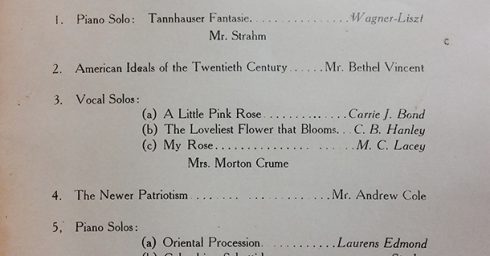 |
Ogden College oratory
Ogden: Samuel Sumpter Daughtry; Robinson: James Albert Mitchell
1914-15
Normal School oratory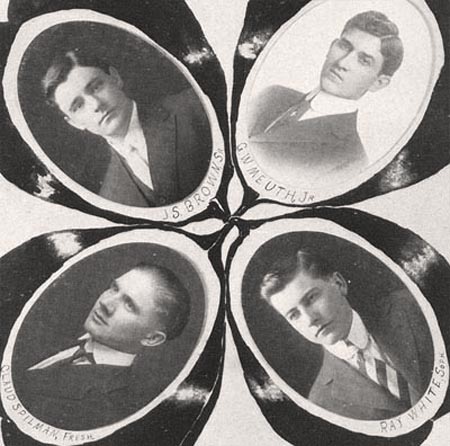 Competitors of the Sixth Annual Western Kentucky State Normal School Inter-society oratory: Claud Spilman (loyals), J. Ray White (Kit Kat), G.W. Meuth (jr), John S. Brown (sr).19 Mr. Brown was declared the winner, and his speech can be found in the above source. |
Normal School unspecified debate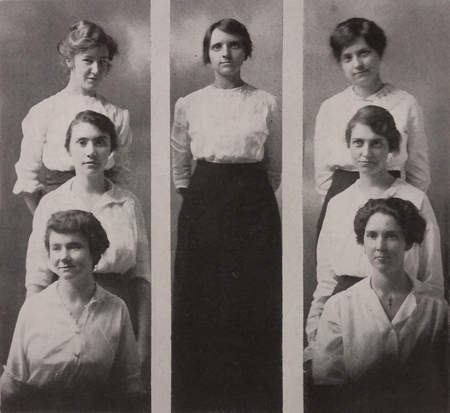 Original caption with notes: The Annual Debate of the Senior Girls; Oration-"The Evolution of Woman," Mrs. W.P. White (center); Debate-"Resolved, That the American Woman Should Be Given the Franchise." Aff: Lottie McClure (top left), Ruth Stephens, Nilla Mae Hancock (bottom left); Neg: Ethel Clark (top right), Lois Cole, Lucile Goodwin (bottom right). When this tradition began or ended is unknown. |
Ogden College oratory
Ogden: John Potter; Robinson: Charles Whittle
1915-16
Normal School debate
There may have been another annual debate between two teams of three women of the senior class of the Normal School, but dating the source is less than certain. A document listing two debate judging instructions is held within the 1916 section of a scrapbook, but it offers no other information.20 The above sub-section includes a photo of just such a debate from the 1915 yearbook. Whether these instructions really relate to a second debate in 1916 or stem from the previous 1915 debate remains unclear. Regardless, both sources do refer to it as an "annual debate" from the senior class.
Normal School oratory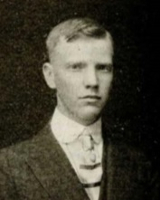 W. R. Funk--to the left--was declared the winner of the seventh annual inter-society
oratorical, and his speech can be found in the following source.21 Contestants: G.W. Meuth (sr), G.G. Nichols (jr), W.R. Funk (soph). Click the image
to the right for a full version of the program. W. R. Funk--to the left--was declared the winner of the seventh annual inter-society
oratorical, and his speech can be found in the following source.21 Contestants: G.W. Meuth (sr), G.G. Nichols (jr), W.R. Funk (soph). Click the image
to the right for a full version of the program.
|
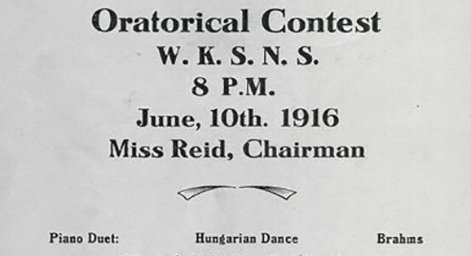 |
1916-17
1917-8 and 1918-19
Ogden College oratory
Ogden Medal Winners
|
Robinson Oratorical Winners
|
- Speech education explored in Capps, Randall. Speech Education in Kentucky, 1792-1968. Bowling Green: BGKY Assoc. of Communication Arts, 1974; Debate competition's revival found in Ralph Curtis Ringwalt, "Intercollegiate Debating," The Forum, Vol 22 (Knickerbocker Press, New York: January 1897), 633-40.
- Leonard M. Davis. "A History of the Study of Oral Communication at West Virginia University." (1998) p29. http://communicationstudies.wvu.edu/files/d/bf757732-b79b-48d1-addb-2bd23fcdd25d/1358108097-3.pdf; Kolan Thomas Morelock. Taking the Town: Collegiate and Community Culture in the Bluegrass, 1880-1917. (University Press of KY, 2009) p200-08.
- A quick but incomplete summary of winners can be found at the following URL: http://www.wku.edu/library/archive/documents/d2467.pdf
- The sources, all secondary, describe the 1880 literary society as almost immediately sprouting the Ogden Debating Society. Over the next two decades the two groups merged again, initially as the Ogden Debating Society, before finally returning to the name Ogden Literary Society. To give a sense of scale, in 1917 it boasted a little over fifty members. Ogden College, "UA97/7 Cardinal Yearbook" (1917). WKU Archives Records. Paper 169. http://digitalcommons.wku.edu/dlsc_ua_records/169
- Kolan T. Morelock. Taking the Town: Collegiate and Community Culture in the Bluegrass, 1880-1917 (University Press of KY: 2008) p97-123. ; T.J. Coates. Correspondence with Henry Hardin Cherry. 12 February 1920. UA3.1.2.1, Box 3, Folder 62. Library Special Collections, Western Kentucky University.
- Western Kentucky University, "UA12/1/1 Elevator, Vol. III, No. 3" (1912). WKU Archives Records. Paper 1907. http://digitalcommons.wku.edu/dlsc_ua_records/1907
- Southern Normal School, "UA96/1 Southern Educator, Vol. III, No. 4" (1899). WKU Archives Records. Paper 29. http://digitalcommons.wku.edu/dlsc_ua_records/29
- Southern Normal School, "UA96/1 Southern Educator, Vol. IV, No. 2" (1900). WKU Archives Records. Paper 32. http://digitalcommons.wku.edu/dlsc_ua_records/32
- Western Kentucky University, "UA12/1/1 Elevator, Vol. I, No. 7" (1910). WKU Archives Records. Paper 1925. http://digitalcommons.wku.edu/dlsc_ua_records/1925
- Western Kentucky University, "UA12/1/1 Elevator, Vol. I, No. 5" (1910). WKU Archives Records. Paper 1904. http://digitalcommons.wku.edu/dlsc_ua_records/1904; Whether this Central Oratorical League was really the Ohio-centered league which had dissolved two years earlier is unclear, but dubious.
- The documents of this period routinely indicate that the sophomore class, known as the Kit Kats, were more associated with oratory and debate competition than were the other classes. In fact, the very nickname of the sophomore class, Kit Kats, honored the famous London Kit Kat Club, an Eighteenth Century political and literary group. A sophomore’s curriculum–also a two-year program–appears to have emphasized literary studies, oration, and oral reading. The activities together were commonly referred to as “forensics.”
- If this truly was a newly created league, it could explain President Cherry's 1920 reluctance to create another oratorical league. WKU Archives Records. UA1C9.95; Also, OS Box 52, Folder 2, Cut Scrapbook 1909-1911, no date, no publication. Library Special Collections, Western Kentucky University. Note that the publication may have been the Bowling Green Times-Journal, considering that it was the primary newspaper for the area at that time.
- The Central Oratorical Association dissolved after 1908, and its successor--the Civic Intercollegiate Oratorical League--hosted its first tournament in 1911. Given that WKSNS claimed to have joined the first league in 1910 for a tournament that never occurred, this author suspects that was actually the first Civic league tournament that failed to meet. Details on both leagues in, Robert Irving Fulton & Elton Raymond Shaw, eds. Historical Sketches Giving Our Complete Record in Debate and Oratory. (Ohio Wesleyan U: Delaware, OH, 1916) Ohio Wesleyan University Library. Details on the Central league as of 1909 in, "Change in Oratorical League" in The Ohio Wesleyan Transcript, Vol 42, No 24. 7 April 1909. p2. http://cdm15963.contentdm.oclc.org/cdm/ref/collection/p15963coll9/id/91965
- For the announcement of the winner, Western Kentucky University, "UA12/1/1 Elevator, Vol. II, No. 8" (1911). WKU Archives Records. Paper 1938. http://digitalcommons.wku.edu/dlsc_ua_records/1938; For the prediction of moving on to the Interstate Oratorical, Western Kentucky University, "UA12/1/1 Elevator, Vol. II, No. 4" (1911). WKU Archives Records. Paper 1927. http://digitalcommons.wku.edu/dlsc_ua_records/1927; For details of changed in the line-up, Western Kentucky University, "UA12/1/1 Elevator, Vol. II, No. 6" (1911). WKU Archives Records. Paper 1930. http://digitalcommons.wku.edu/dlsc_ua_records/1930
- This was the contest at which the Kit Kat qualifier mentioned at the top was aimed; Western Kentucky University, "UA12/1/1 Elevator, Vol. III, No. 9" (1912). WKU Archives Records. Paper 1913. http://digitalcommons.wku.edu/dlsc_ua_records/1913
- The event program was apparently mis-labeled as "Fifth Annual"; For a first list of competitors, Western Kentucky University, "UA12/1/1 Elevator, Vol. IV, No. 8" (1913). WKU Archives Records. Paper 1922. http://digitalcommons.wku.edu/dlsc_ua_records/1922; For the final list, the winner, and a copy of the winner's speech, Western Kentucky University, "UA12/1/1 Elevator, Vol. IV, No. 9" (1913). WKU Archives Records. Paper 1933. http://digitalcommons.wku.edu/dlsc_ua_records/1933
- A men's college in this period, Bethel College later dissolved in 1964. The Cardinal, vol 2, Ogden College 1914 (Bowling Green, KY: Times-Journal Press, 1914), 69.
- Western Kentucky University, "UA12/1/1 Elevator Vol. V, No. 9" (1914). WKU Archives Records. Paper 21. http://digitalcommons.wku.edu/dlsc_ua_records/21
- Western Kentucky University, "UA12/1/1 Elevator, Vol. VI, No. 10" (1915). WKU Archives Records. Paper 23. http://digitalcommons.wku.edu/dlsc_ua_records/23
- UA3.1.8, scrapbook, Box 2; Judges Debate Instructions, 91. Library Special Collections, Western Kentucky University.
- Western Kentucky University, "UA12/1/1 Elevator, Vol. VII, No. 10" (1916). WKU Archives Records. Paper 1947. http://digitalcommons.wku.edu/dlsc_ua_records/1947
Some of the links on this page may require additional software to view.


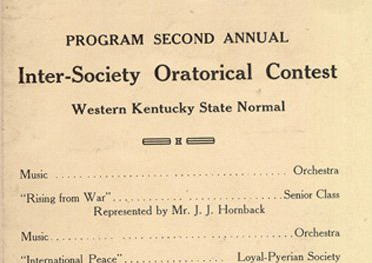
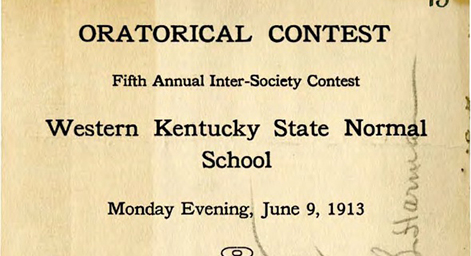
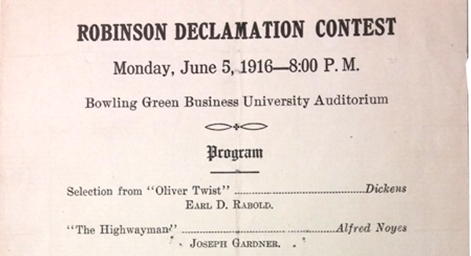
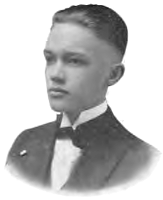 Ogden: James Albert Mitchell; Robinson: Rodes Kirby Myers. To the left is Ogden Oratorical winner James Albert Mitchell.
Click to the right for the full version of the program for the 1917 Robinson Declamation.
Ogden: James Albert Mitchell; Robinson: Rodes Kirby Myers. To the left is Ogden Oratorical winner James Albert Mitchell.
Click to the right for the full version of the program for the 1917 Robinson Declamation.
